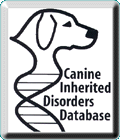
Exocrine pancreatic insufficiency
The pancreas has 2 functional parts. The endocrine part secretes insulin and glucagon, which are essential for the metabolism of carbohydrates. The exocrine part consists of units called acini that produce and secrete enzymes essential for the digestion of protein, into the small intestine.
With exocrine pancreatic insufficiency (EPI), there is gradual wasting away (atrophy) of the acini. Clinical signs do not develop until most of the acini are gone. As dogs lose the ability to digest protein, they progressively lose weight despite a voracious appetite.
This is thought to be an autosomal recessive trait in the German shepherd.
Affected dogs lose weight despite voracious appetites, and usually pass large amounts of semi-formed feces. They often eat their own stools, or other inappropriate substances.
Some dogs with this condition do not show these typical signs, and may experience intermittent watery diarrhea or vomiting.
The clinical signs of weight loss and increased appetite may occur with malabsorption of nutrients due to a variety of causes. Routine diagnostic tests will eliminate some of these as possibilities. Once EPI is suspected, there are specific laboratory tests that will diagnose this disorder.
Although this disorder can not be cured, management is generally fairly straightforward. Powdered pancreatic enzyme extract is mixed in with each meal. Within a few days, your dog's appetite and stools should become more normal, and s/he will begin to gain weight. Your veterinarian will work with you to determine the best regime (what dose of extract, 1 or 2 feedings per day) to keep your dog free of clinical signs. Enzyme supplementation of your dog's food will be necessary for life.
Some dogs fail to gain weight despite treatment, and this may be due to chronic bacterial overgrowth. A course of antibiotic therapy may be useful in these dogs.
Assay of serum trypsin-like immunoreactivity (TLI), bentiromide absorption test, and quantitative assay of fecal proteolytic activity (azocasein substrate) are sensitive tests for EPI in the dog. TLI is also a specific test, and requires only 1 sample for diagnosis. (Check with your diagnostic laboratory).
Affected dogs, and in German shepherds, their parents (considered carriers) and siblings (suspect carriers) should not be used for breeding.
FOR MORE INFORMATION ABOUT THIS DISORDER, PLEASE SEE YOUR VETERINARIAN.
- (Disorder) related terms:
- Disorder Type:

